许国章第2册第15课
许国璋英语第二册第二课课文、对话、练习,前微软中国区总经理吴士宏学习英文的教 材
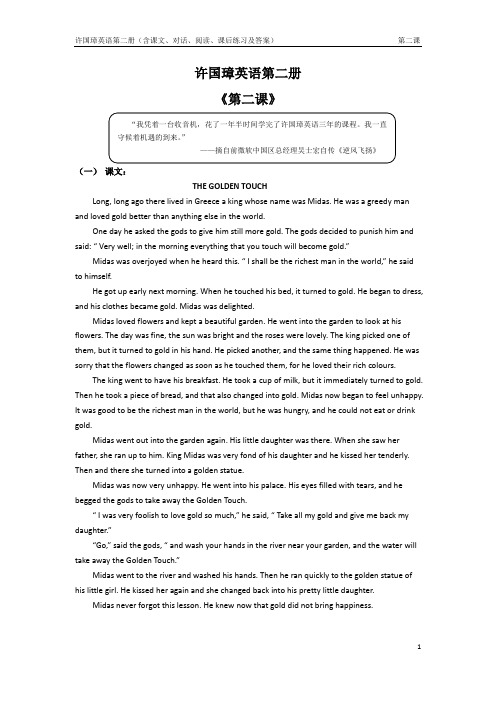
许国璋英语第二册《第二课》(一)课文:THE GOLDEN TOUCHLong, long ago there lived in Greece a king whose name was Midas. He was a greedy man and loved gold better than anything else in the world.One day he asked the gods to give him still more gold. The gods decided to punish him and said: “ Very well; in the morning everything that you touch will become gold.”Midas was overjoyed when he heard this. “ I shall be the richest man in the world,” he said to himself.He got up early next morning. When he touched his bed, it turned to gold. He began to dress, and his clothes became gold. Midas was delighted.Midas loved flowers and kept a beautiful garden. He went into the garden to look at his flowers. The day was fine, the sun was bright and the roses were lovely. The king picked one of them, but it turned to gold in his hand. He picked another, and the same thing happened. He was sorry that the flowers changed as soon as he touched them, for he loved their rich colours.The king went to have his breakfast. He took a cup of milk, but it immediately turned to gold. Then he took a piece of bread, and that also changed into gold. Midas now began to feel unhappy. It was good to be the richest man in the world, but he was hungry, and he could not eat or drink gold.Midas went out into the garden again. His little daughter was there. When she saw her father, she ran up to him. King Midas was very fond of his daughter and he kissed her tenderly. Then and there she turned into a golden statue.Midas was now very unhappy. He went into his palace. His eyes filled with tears, and he begged the gods to take away the Golden Touch.“ I was very foolish to love gold so much,” he said, “ Take all my gold and give me back my daughter.”“Go,” said the gods, “ and wash your hands in the river near your garden, and the water will take away the Golden Touch.”Midas went to the river and washed his hands. Then he ran quickly to the golden statue of his little girl. He kissed her again and she changed back into his pretty little daughter.Midas never forgot this lesson. He knew now that gold did not bring happiness.(二)课文译文点金术很久很久以前,在希腊居住着一位名叫迈达斯的国王。
许国璋英语第一册第十五课课文、对话、练习、答案

许国璋电视英语教学第一册《第十五课》(一)课文:1)课文原文:A SERVICE CENTERLook at this service center. How busy everybody is!The man in the middle is mending shoes. At a counter on the right, a woman isshowing an old man a towel and some soap. We see a girl at the door. She is going tohousework for the families in neighborhood.Two women are sewing by the window. One of them is making a shirt and theother is making a pair of trousers.The workers at the service center help their neighbor in many ways. They play an important part in people’s life.(二)DIALGUE:(对话)1)原文:IN THE COMPUTER ROOM-Is this your school computer room? Who are these people?-They are students of the Russian department.-What are they doing?-They are learning to use computers.-Do you often work her?-Yes ,we work here once a week. We are all keen to learn modem techniques.(三)新单词:(四)译文:1)课文译文:服务中心瞧这家服务中心,大伙儿多忙呀!中间这位男子正在修鞋,靠右边的柜台里,女售货员拿出毛巾和肥皂给一位老人看。
人教版历史必修二:第15课《交通和通讯工具的进步》同步练习及答案
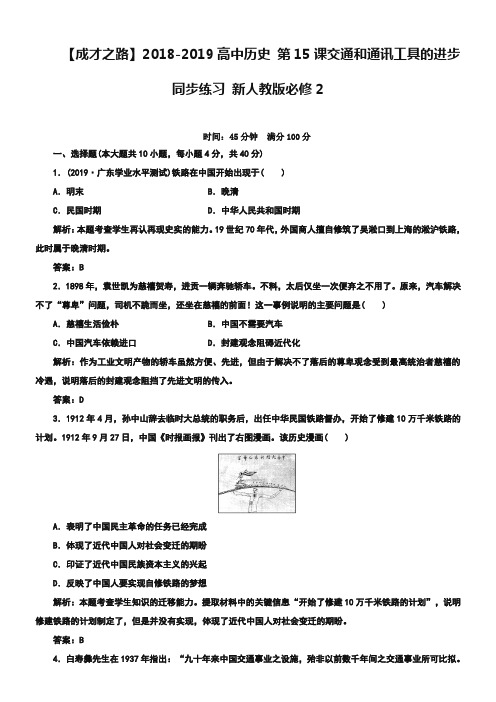
【成才之路】2018-2019高中历史第15课交通和通讯工具的进步同步练习新人教版必修2时间:45分钟满分100分一、选择题(本大题共10小题,每小题4分,共40分)1.(2019·广东学业水平测试)铁路在中国开始出现于( )A.明末B.晚清C.民国时期D.中华人民共和国时期解析:本题考查学生再认再现史实的能力。
19世纪70年代,外国商人擅自修筑了吴淞口到上海的淞沪铁路,此时属于晚清时期。
答案:B2.1898年,袁世凯为慈禧贺寿,进贡一辆奔驰轿车。
不料,太后仅坐一次便弃之不用了。
原来,汽车解决不了“尊卑”问题,司机不跪而坐,还坐在慈禧的前面!这一事例说明的主要问题是( ) A.慈禧生活俭朴B.中国不需要汽车C.中国汽车依赖进口D.封建观念阻碍近代化解析:作为工业文明产物的轿车虽然方便、先进,但由于解决不了落后的尊卑观念受到最高统治者慈禧的冷遇,说明落后的封建观念阻挡了先进文明的传入。
答案:D3.1912年4月,孙中山辞去临时大总统的职务后,出任中华民国铁路督办,开始了修建10万千米铁路的计划。
1912年9月27日,中国《时报画报》刊出了右图漫画。
该历史漫画( )A.表明了中国民主革命的任务已经完成B.体现了近代中国人对社会变迁的期盼C.印证了近代中国民族资本主义的兴起D.反映了中国人要实现自修铁路的梦想解析:本题考查学生知识的迁移能力。
提取材料中的关键信息“开始了修建10万千米铁路的计划”,说明修建铁路的计划制定了,但是并没有实现,体现了近代中国人对社会变迁的期盼。
答案:B4.白寿彝先生在1937年指出:“九十年来中国交通事业之设施,殆非以前数千年间之交通事业所可比拟。
在此一点上,我们不能不说是近年交通事业之进步。
”他所说的“进步”应包括( )①传统的代步工具逐渐被新式交通工具所取代②由机械牵引的电车与汽车出现③城市交通系统有所发展④内地与西北、西南等地区之间都有铁路交通A.①②③B.②③④C.①③④D.①②③④解析:材料反映的是中国近代交通事业发展的状况,特别要注意“1937年”这个时间限制,当时内地与西北、西南地区还没有铁路联系。
许国璋英语第二册第四课课文、对话、练习、答案

许国璋英语第二册第四课课文、对话、练习、答案许国璋电视英语教学第二册《第四课》(一)课文:1)课文原文:AN OUTINGWe were discussing where to go for an outing during the spring holidays. Some suggested the Guanting Reservoir. Others wanted to see the Great Wall. Then someonesaid: “ Why not go back to Anzhuang for a visit?”At this we all cheered. Of course, we would revisit that beautiful mountain village on the banks of the Yongding River!The place was dear to us all. We had gone there the year before to plant trees in the surrounding mountains. We had formed close ties with the villagers.So early next morning we were off to Anzhuang on the 7:30 train. It was a fine day in April. Everyone was in high spirits. We could hardly sit still, for there were so manyinteresting sights outside the windows. We saw new factories and well-cultivated fieldsall along the line. At Shijingshan we passed the huge steel mill and the power plant. Then suddenly we saw the green Yongding River in the valley below. Our hearts gave a leap, for we knew that in a few minutes we would be with our friends at Anzhuang again.They were overjoyed to see us. The old villagers kept asking how we were. They were pleased to see how much stronger some of us had become. Then some old friends of ours took us to see what they had achieved. New houses, larger schools, more sheep,more pigs and chickens, more cows and horses – everywhere we saw signs of prosperity.Then we climbed the mountains. The villagers showed us the trees we had planted. Wewere happy to see that most of them were growing well. At one place we found someyoung people digging pits. They were getting things ready for this year’s tree-planting.We all joined them in the work.But the time soon came for us to return. It was getting dark.We told our friends that we would soon come back to plant trees again.Back in the train, we told each other what a wonderful time we had had that day.“An outing like this is certainly more exciting than picnicking in t he Summer Palace,”one comrade said.“ Or on the Great Wall,” another added.They spoke for us all.一次效游我们正在讨论在春假期间去哪里郊游。
许国璋英语第二册第十三课课文、对话、练习

许国璋英语第二册《第十三课》(一)课文:1)课文原文:THE LAST LESSONAlphonse Daudet( adapted)I was very late that morning on my way to school and was afraid of being scolded.The master had told us he would question us on verbs, and I did not know a thingabout them, for I had not studied my lesson.For a moment I thought of playing truant. The air was so warm and bright, and I could hear the blackbirds whistling at the edge of the woods, and the Prussians drillingin the meadow behind the sawmill.I like this much better than learning the rules for verbs, but I did not dare to stop,so I ran quickly towards school.Passing the mayor’s office, I saw people standing before the little bulletin board.For two years it was there that we had received all the news of battles, of victories anddefeats.“What is it now?” I thought, without stopping.Then, as I ran along, the blacksmith, who was there reading the notice, cried out to me, “ Not so fast, little one, you will reach your school soon enough.”I thought he was making fun of me and ran faster than ever, reaching theschoolyard quite out of breath.Usually at the beginning of school, the noise of desks being opened and closed, and lessons repeated at the top of the children’s voices could be heard out in the street.Occasionally the master beat the table with the heavy ruler as he cried, “ Silence,please, silence!”I had hoped to be able to take my seat in all this noise without being seen; butthat morning the room was quiet and orderly.Through the open window I saw my schoolmates already in their places. The master was walking up and down the room with the iron ruler under his arm and a book in his hand.As I entered he looked at me kindly, and said, without scolding,” Go quickly to your place, little Franz; we were going to begin without you. You should have been here five minutes ago.”I climbed over my bench and sat down at once at my desk. Just then I noticed, for the first time, that our master wore his fine green coat and his black silk embroidered cap.But what surprised me most was to see some of the village people seated on the benches at the end of the room. One of them was holding an old spelling book on his knee; and they all looked sadly at the master.While I was wondering at this, our schoolmaster took his place. “ Children,” he said, “ this is the last time that I shall give you a lesson. An order has come from Berlin that no language but German may be taught in the schools of Alsace and Lorraine. A new master will come tomorrow who will teach you German. Today is your last lesson in French. I beg you to pay attention.”These words frightened me. This was what they had posted on the bulletin board then! This was what the blacksmith was reading!(to be continued)2)全文译文:最后一课阿方斯·都德(改写)那天早上我很晚才去上学,心中害怕要挨训斥。
第15课 两次鸦片战争
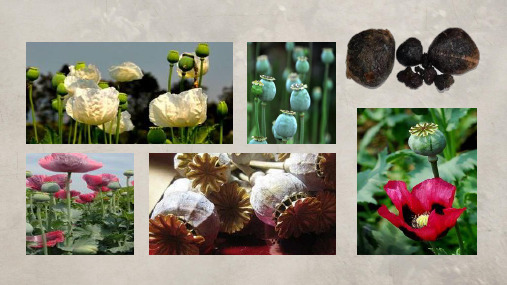
壹 傲慢与自大——文明的差异
资本主义 迅速崛起
先进的工业文明 VS 落后的农耕文明
封建统治 危机四伏
政治
经济
军事
外交
世界 民主政治 中国 封建专制
工业革命 小农经济
坚船利炮 军备废弛
殖民扩张 闭关自守
目录 CONCENTS
壹 傲慢与自大——文明的差异 贰 交手与失手——文明的碰撞 叁 痛苦与反思——文明的重生
交手与失手 | 碰撞
鸦片战争(1840-1842)后签订的不平等条约
时间
条约名称
主要内容
影响
割让香港岛
开了割让土地的先例
1842年
中英《南京条约》
赔款2100万银元 接受协定关税
开了勒索赔款的恶例 中国开始丧失关税自主权
开放五口通商
打开了中国东南沿海门户
1843年 中英《虎门条约》 协定关税、领事裁
交手与失手 | 原因
鸦片战争前中英两国贸易情况对比
逆 白银流入中国 顺
差
( 入
英
超国
呢绒、布匹
正当贸易
差
中
( 出
国超
)
茶叶、生丝、瓷器
)
中国自给自足的自然经济对外国的工业品具有顽强的抵抗力和清政府实行闭 关政策的限制,使英国不可能在中国为自己的商品打开市场,因而出现贸易逆差。
交手与失手 | 原因
【课程标准】认识鸦片战争对中国社会的影响。
交手与失手 | 时空
学习任务:制作图谱,定位两次鸦片战争的时空
第一次鸦片战争
虎门硝烟 《南京》
1839
1842
《黄埔》 《望厦》
第15课 两次鸦片战争 课件高一上学期统编版(2019)必修中外历史纲要上

第15课 两次鸦片战争
——鸦片战争的背景 史料一 史学家黄仁宇说:“在西方与中国针锋相对前夕,清朝已未战 先衰。”史学家戴逸认为:“中国社会已落后于西方,但历史经常被迷 雾笼罩着。18世纪的康乾盛世,貌似太平辉煌,实则正在滑向衰世凄 凉,可当时中国没有人认识这一历史真相,只有岁月推移,迷雾消散, 矛盾激化,百孔千疮才逐渐暴露。” 史料二 关于鸦片战争,有人认为,“自由贸易者背后的经济能力极其 强大,无法遏制或阻挡”“如果在鸦片之外还有其他好的选择,比如说 糖蜜或者大米,这场冲突就可能被称为糖蜜战争或者大米战争”。
根本 直接 重要
为进一步打开中__国__市__场__ 英国等国的_修__约_要求遭绝 未能达到鸦片贸易合__法__化__的目的
第15课 两次鸦片战争
(2)借口:“_亚__罗__号_”事件。 (3)经过:1856年,英、法两国发动;1860年10月,英法联军抢劫、 焚毁圆__明__园__后,进入北京城。 (4)结果:清政府被迫签订一系列不平等条约。
第15课 两次鸦片战争
3.半殖民地半封建社会 半殖民地是指在形式上具有自己政府的独立国家,实际上政治、经 济等社会各方面都受到外国殖民主义的控制和奴役。“半封建”是 指政治、经济、文化既保存了封建主义,又发展了资本主义。
第15课 两次鸦片战争
误区警示 对鸦片战争的性质认识不清
有西方史学家称鸦片战争为“通商战争”,认为这场战争是英国为 维护正常贸易而进行的。这种观点是错误的,它掩盖了英国发动鸦 片战争的侵略性和非正义性,是为英国殖民侵略进行辩护。
1844年
签约国家
内容
主要危害
中英 中英
割让香__港__岛__、赔款2 100 英、美、法
万银元、接受协定关税 三国从中国
许国璋英语第二册第六课课文、对话、练习、答案

许国璋英语第二册《第六课》(一)课文:1)课文原文:LIFE AT GATESHEAD HALLIt was a cold winter day. The wind had brought dark clouds and heavy rain, so it was impossible to take a walk. Eliza, john and Georgiana were gathered round theirmother in the sitting-room. She lay on a sofa by the fireside, looking perfectly happywith her darlings about her. But she told me not to come near them because I was nota good child.I went to a small room next to the drawing-room. Taking a book from a bookcase, Iclimbed up into the window-seat. Here I sat behind the curtains and started reading. Iwas quite happy until I heard the voice of John Reed.“ Where is she?” he said, calling to his sisters, “ Eliza!Georgiana! Jane is not here.”I was glad that I had drawn the curtains, and I prayed that I should not bediscovered. But Eliza was quicker than John. She said at once: “She is in thewindow-seat of course.”I came out immediately. “ What do you want?” I asked.“Say ‘ What do you want, Master Reed’,” was his reply.” I want you to come here,”he added. And he sat down in an armchair.John Reed was a school-boy of fourteen: four years older than I, for I was only ten.He was big and stout for his age, with a large face and an unhealthy skin. John had notmuch love for his mother and sisters, but he really hated me. As I came up to his chair,he spent about three minutes in putting out his tongue at me. Then he hit me suddenlyand hard.“ What were you doing behind the curtains?”“ I was reading.”“ Show me the book.”First he put out his tongue at Jane and hit her hard. A little while later, he knockedher over with a book and grasped her hair and shoulder.I returned to the window and brought the book. “ You have no business to read our books,” John Reed continued. “ You are a dependent, Mama says. Your father left you no money. You ought to beg, and not live with a gentleman’s children. Go and stand by the door.”I did so. I turned round and saw that he was going to throw the book at me; I tried to avoid it, but it was too late. I was knocked over and fell against the door, striking my head and cutting it badly. The pain was very sharp.“Wicked, cruel boy!”I said. “You are like a murderer –you are like a slave-driver!”“ What!” he cried. “ What did you say to me? Did you hear her, Eliza and Georgiana? I’ll tell Mama. But first –“He ran at me and grasped my hair and my shoulder. But I was desperate now. I don’t know what I did with my hands, but I heard him cry for help.Mrs. Reed came. “ Take her away to the red room and lock her in,” she said. Four hands then quickly carried me upstairs.“For shame!” cried the maid. “ To strike a gentleman, your young master!”“ Master? How is he my master? Am I a servant?”“ you ought to know, miss,” said the nurse, “ that you owe much to Mrs. Reed. She keeps you. If she turns you away, you will have to go to the poor-house.”These words were not new to me; so I did not answer.( Adapted from Jane Eyre by Charlotte Bronte)2)课文译文:盖茨海德庄园生活那是一个寒冷的冬日。
许国璋英语第二册第九课课文、对话、练习
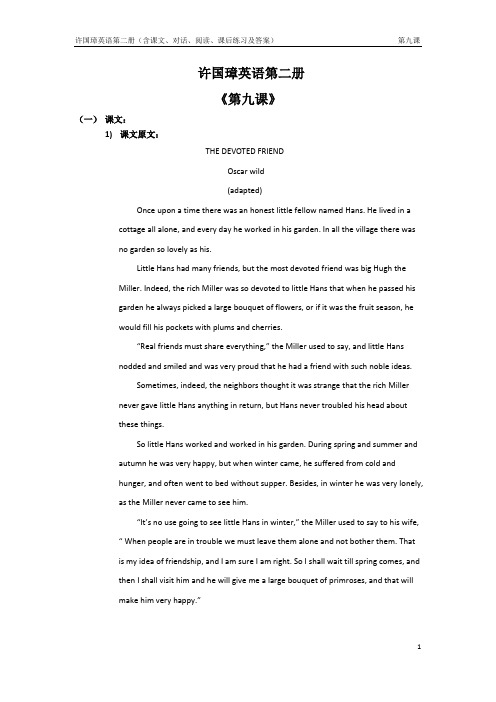
许国璋英语第二册《第九课》(一)课文:1)课文原文:THE DEVOTED FRIENDOscar wild(adapted)Once upon a time there was an honest little fellow named Hans. He lived in a cottage all alone, and every day he worked in his garden. In all the village there wasno garden so lovely as his.Little Hans had many friends, but the most devoted friend was big Hugh the Miller. Indeed, the rich Miller was so devoted to little Hans that when he passed hisgarden he always picked a large bouquet of flowers, or if it was the fruit season, hewould fill his pockets with plums and cherries.“Real friends must share everything,” the Miller used to say, and little Hans nodded and smiled and was very proud that he had a friend with such noble ideas.Sometimes, indeed, the neighbors thought it was strange that the rich Miller never gave little Hans anything in return, but Hans never troubled his head aboutthese things.So little Hans worked and worked in his garden. During spring and summer and autumn he was very happy, but when winter came, he suffered from cold andhunger, and often went to bed without supper. Besides, in winter he was very lonely,as the Miller never came to see him.“It’s no use going to see little Hans in winter,” the Miller used to say to his wife, “ When people are in trouble we must leave them alone and not bother them. Thatis my idea of friendship, and I am sure I am right. So I shall wait till spring comes, andthen I shall visit him and he will give me a large bouquet of primroses, and that willmake him very happy.”“ You think so much about others,” said his wife, “ It is a pleasure to hear what you say about friendship. I am sure the priest himself cannot say such beautifulthings as you do, though he lives in a three-storeyed house, and wears a gold ring on his little finger.”“ But why don’t we ask little Hans to come here?” said the Miller’s youngest son. “ If poor Hans in trouble I shall give him half my porridge, and show him mywhite rabbits.”“ What a silly boy you are !” cried the Miller. “ I really don’t know what is the use of sending you to school. You do not learn anything. Why , if little Hans comes here, and sees our warm fire, and our good supper, and our red wine, he will envy us, and envy is a terrible thing. Besides, if Hans comes here, he will ask me to give him some flour on credit, and I cannot do that. Flour is one thing ,and friendship isanother. The words are spelt differently and they mean quite different things.”“How right you are!” said the Miller’s wife, “ Really, I feel quite sleepy. This is just like sitting in church.”(to be continued )2)译文:忠实的朋友奥斯卡·怀尔德(改编)从前有一个诚实的小家伙叫汉斯。
许国璋英语第二册第十四课课文、对话、练习
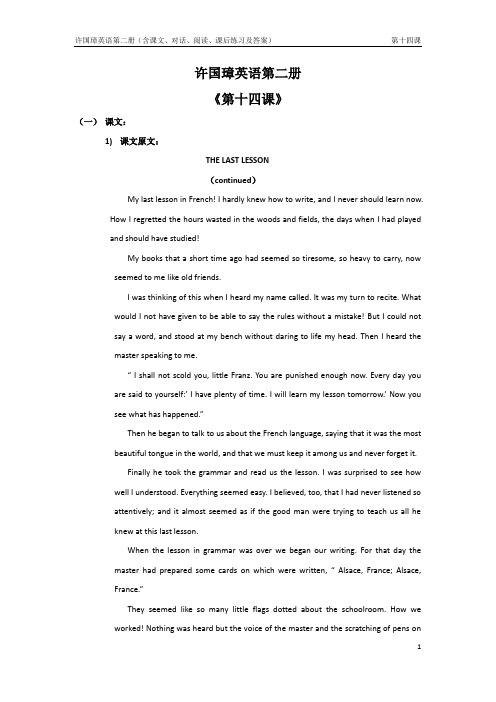
许国璋英语第二册《第十四课》(一)课文:1)课文原文:THE LAST LESSON(continued)My last lesson in French! I hardly knew how to write, and I never should learn now.How I regretted the hours wasted in the woods and fields, the days when I had playedand should have studied!My books that a short time ago had seemed so tiresome, so heavy to carry, now seemed to me like old friends.I was thinking of this when I heard my name called. It was my turn to recite. Whatwould I not have given to be able to say the rules without a mistake! But I could notsay a word, and stood at my bench without daring to life my head. Then I heard themaster speaking to me.“ I shall not scold you, little Franz. You are punished enough now. Every day you are said to yourself:’ I have plenty of time. I will learn my lesson tomorrow.’ Now yousee what has happened.”Then he began to talk to us about the French language, saying that it was the most beautiful tongue in the world, and that we must keep it among us and never forget it.Finally he took the grammar and read us the lesson. I was surprised to see how well I understood. Everything seemed easy. I believed, too, that I had never listened soattentively; and it almost seemed as if the good man were trying to teach us all heknew at this last lesson.When the lesson in grammar was over we began our writing. For that day the master had prepared some cards on which were written, “Alsace, France; Alsace,France.”They seemed like so many little flags dotted about the schoolroom. How we worked! Nothing was heard but the voice of the master and the scratching of pens onpaper. There was no time for play now. on the roof of the schoolhouse some pigeons were softly cooing, and I said to myself, “Will they, too, be obliged to sing in German?”From time to time, when I looked up from my page, I saw the master looking about him as if he wished to impress upon his mind everything in the room.After writing, we had a history lesson. Next, the little ones recited in concert their “Ba, be, be, bo, bu”.Oh, I shall always remember that last lesson!Suddenly the church clock struck twelve. The master rose from his chair. “My friends,” said he, “my friends, …i…i…”But something choked him; he could not finish the sentence. He returned to the blackboard, took a piece of chalk, and wrote in large letter, “VIVE LA FRANCE.”Then he stood leaning against the wall, unable to speak. He signed to us with his hand. “ The lesson is over. You are dismissed.”2)全文译文:最后一课(续)我最后一次上法语课了!我几乎还不会作文呢,就再也不能学了。
许国璋英语第二册第八课课文、对话、练习
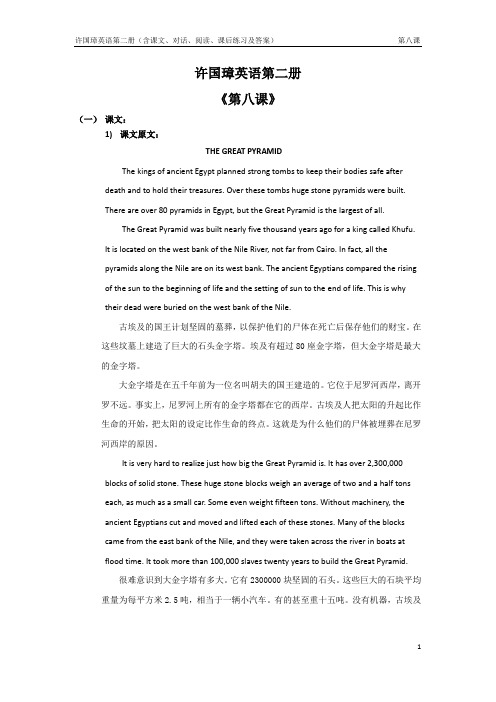
许国璋英语第二册《第八课》(一)课文:1)课文原文:THE GREAT PYRAMIDThe kings of ancient Egypt planned strong tombs to keep their bodies safe after death and to hold their treasures. Over these tombs huge stone pyramids were built.There are over 80 pyramids in Egypt, but the Great Pyramid is the largest of all.The Great Pyramid was built nearly five thousand years ago for a king called Khufu.It is located on the west bank of the Nile River, not far from Cairo. In fact, all thepyramids along the Nile are on its west bank. The ancient Egyptians compared the rising of the sun to the beginning of life and the setting of sun to the end of life. This is whytheir dead were buried on the west bank of the Nile.古埃及的国王计划坚固的墓葬,以保护他们的尸体在死亡后保存他们的财宝。
在这些坟墓上建造了巨大的石头金字塔。
埃及有超过80座金字塔,但大金字塔是最大的金字塔。
大金字塔是在五千年前为一位名叫胡夫的国王建造的。
它位于尼罗河西岸,离开罗不远。
事实上,尼罗河上所有的金字塔都在它的西岸。
(人教版)历史必修二:第15课《交通和通讯工具的进步》作业及答案
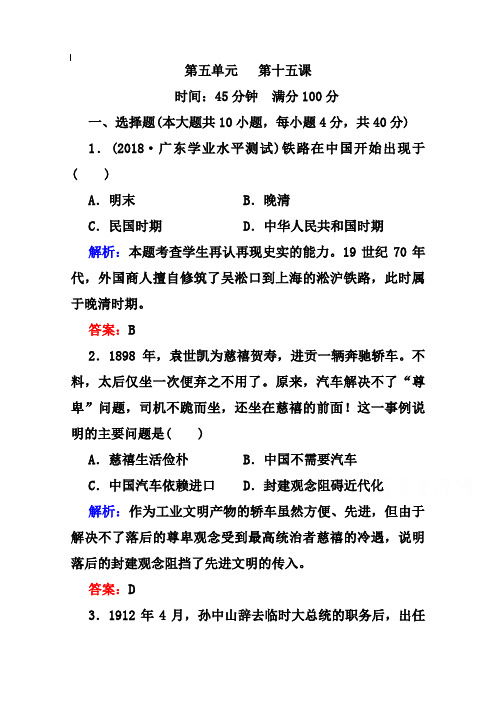
第五单元第十五课时间:45分钟满分100分一、选择题(本大题共10小题,每小题4分,共40分)1.(2018·广东学业水平测试)铁路在中国开始出现于( )A.明末B.晚清C.民国时期D.中华人民共和国时期解析:本题考查学生再认再现史实的能力。
19世纪70年代,外国商人擅自修筑了吴淞口到上海的淞沪铁路,此时属于晚清时期。
答案:B2.1898年,袁世凯为慈禧贺寿,进贡一辆奔驰轿车。
不料,太后仅坐一次便弃之不用了。
原来,汽车解决不了“尊卑”问题,司机不跪而坐,还坐在慈禧的前面!这一事例说明的主要问题是( )A.慈禧生活俭朴B.中国不需要汽车C.中国汽车依赖进口D.封建观念阻碍近代化解析:作为工业文明产物的轿车虽然方便、先进,但由于解决不了落后的尊卑观念受到最高统治者慈禧的冷遇,说明落后的封建观念阻挡了先进文明的传入。
答案:D3.1912年4月,孙中山辞去临时大总统的职务后,出任中华民国铁路督办,开始了修建10万千米铁路的计划。
1912年9月27日,中国《时报画报》刊出了右图漫画。
该历史漫画( )A.表明了中国民主革命的任务已经完成B.体现了近代中国人对社会变迁的期盼C.印证了近代中国民族资本主义的兴起D.反映了中国人要实现自修铁路的梦想解析:本题考查学生知识的迁移能力。
提取材料中的关键信息“开始了修建10万千米铁路的计划”,说明修建铁路的计划制定了,但是并没有实现,体现了近代中国人对社会变迁的期盼。
答案:B4.白寿彝先生在1937年指出:“九十年来中国交通事业之设施,殆非以前数千年间之交通事业所可比拟。
在此一点上,我们不能不说是近年交通事业之进步。
”他所说的“进步”应包括( )①传统的代步工具逐渐被新式交通工具所取代②由机械牵引的电车与汽车出现③城市交通系统有所发展④内地与西北、西南等地区之间都有铁路交通A.①②③B.②③④C.①③④D.①②③④解析:材料反映的是中国近代交通事业发展的状况,特别要注意“1937年”这个时间限制,当时内地与西北、西南地区还没有铁路联系。
许国璋英语第二册第十二课课文、对话、练习

许国璋英语第二册《第十二课》(一)课文:1)课文原文:A SERVICE OF LOVEJoe came to New York from the Middle West, dreaming about painting. Delia came to New York from the South, dreaming about music. Joe and Delia met in a studio.Before long they were good friends and got married.They had only a small flat to live in, but they were happy. They loved each other, and they were both interested in art. Everything was fine until one day they found theyhad spent all their money.Delia decided to give music lessons. One afternoon she said to her husband:“ Joe, dear, I’ve found a pupil, a general’s daughter. She is a sweet girl. I’m to give three lessons a week and get $ 5 a lesson.”But Joe was not glad.“ but how about me?” he said. “ Do you think I’m going to watch you work while Iplay with my art? No, I want to earn some money too.”“ Joe, dear, you are silly,”said Delia. “ You must keep at your studies. We can live quite happily on $ 15 a week.”“ Well, perhaps I can sell some of my pictures, ” said Joe.Every day they parted in the morning and met in the evening. A week passed andDelia brought home fifteen dollars, but she looked a little tired.“ Clementina sometimes gets on my nerves. I’m afraid she doesn’t practice enough.But the general is the dearest old man! I wish you could know him, Joe.”And then Joe took eighteen dollars out of his pocket.“I’ve sold one of my pictures to a man from Peoria,” he said, “ and he has ordered another.”“ I’m so glad,” said Delia. “ Thirty-three dollars! We never had so much to spend before. We’ll have a good supper tonight.”Next week Joe came home and put another eighteen dollars on the table. In half an hour Delia came, her right hand in a bandage.“What’s the matter with your hand?” said Joe. Delia laughed and said:“ Oh, a funny thing happened! Clemntina gave me a plate of soup and spilled some of it on my hand. She was very sorry for it. And so was the old general. But why are you looking at me like that ,Joe?”“What time this afternoon did you burn your hand, Delia?”“Five o’clock. I think. The iron- I mean the soup – was ready about five. Why?”“Delia, come and sit here,” said Joe. He drew her to the couch and sat beside her.“What do you do every day, Delia? Do you really give music lessons? Tell me the truth.”She began to cry.“I couldn’t get any pupils,” she said. “ So I got a place in a laundry ironing shirts. This afternoon a girl accidentally set down an iron on my hand and I got a bad burn. But tell me. Joe, how did you guess that I wasn’t giving music lessons?”“It’s very simple,” said Joe, “ I knew all about your bandages because I had to send them upstairs to a girl in the laundry who had an accident with a hot iron. You see, I work in the engine-room of the same laundry where you work.”“And your pictures? Did you sell any to that man from Peoria?”“Well, your general with his Clementina is an invention, and so is my man from Peoria.”And then they both laughed.2)全文译文:爱的奉献乔从中西部来到纽约,梦想着绘画。
第15课两次鸦片战争+课件-- 高中历史统编版(2019)必修中外历史纲要上册

贸易合法化
允许华工出国;建 造教堂
关税主权 司法主权
社会
性质 开始沦为半殖民
发生 变化
地半封建社会
贸易主权
半殖民地半封建化程度
领土主权 加重人民经济负担 列强势力深入内地
三、开眼看世界(战争之悟)
有识之士的觉醒
林则徐《四洲志》:林则徐最先冲破“贵华夏、贱夷狄”的
茶叶、生丝、瓷器
英国
(畅销)
走私鸦片
二、两次鸦片战争(战争之殇)
当鸦片未盛行之时,吸食者不过害 及其身,故杖徒已足蔽辜;迨流毒于 天下,则为害甚巨,法当从严。若犹 泄泄视之,是使数十年后,中原几无 可以御敌之兵,且无可以充饷之银 ……
——摘自林则徐奏折
清政府 应对
中国 战败
学生活动:你知道鸦片战争的民族英雄有哪些?
一、十九世纪的世界与中国(战争之因)
➢ 中西对比
西方
中国
政治
确立资本主义制度,处于资本主义上升 期,国力强盛
停留在封建社会,君主专制 顽固;社会矛盾激化,农民 起义此起彼伏
落后的农耕文明PK先进的工业文明 经济 英国率先完成工业革命,成为世界工厂;资本主 自给自足的小农经济是主 义生产方式在英、法、美等国逐渐占据主导地位 要的生产方式
割地
鸦片战争 《南京条约》
割香港岛
第二次鸦片战争
《天津条约》
《北京条约 》
割九龙司一区
赔款 赔款2100万银元
通商 开放五口通商(广、 厦、福、宁、上)
向英法分别赔款400万两和 200万两
增开汉口、南京等十处
赔偿军费增至800 万两
增开天津为商埠
特权
许国璋英语第二册第五课(含课文、对话、阅读、课后练习及答案)
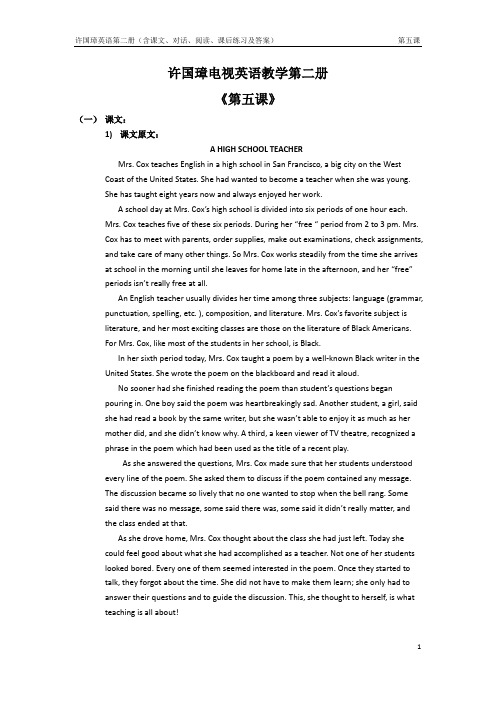
许国璋电视英语教学第二册《第五课》(一)课文:1)课文原文:A HIGH SCHOOL TEACHERMrs. Cox teaches English in a high school in San Francisco, a big city on the West Coast of the United States. She had wanted to become a teacher when she was young.She has taught eight years now and always enjoyed her work.A school day at Mrs. Cox’s high school is divided into six periods of one hour each.Mrs. Cox teaches five of these six periods. During her “free “ period from 2 to 3 pm. Mrs.Cox has to meet with parents, order supplies, make out examinations, check assignments, and take care of many other things. So Mrs. Cox works steadily from the time she arrivesat school in the morning until she leaves for home late in the afternoon, and her “free”periods isn’t really free at all.An English teacher usually divides her time among three subjects: language (grammar, punctuation, spelling, etc. ), composition, and literature. Mrs. Cox’s favorite subject isliterature, and her most exciting classes are those on the literature of Black Americans.For Mrs. Cox, like most of the students in her school, is Black.In her sixth period today, Mrs. Cox taught a poem by a well-known Black writer in the United States. She wrote the poem on the blackboard and read it aloud.No sooner had she finished reading the poem than student’s questions began pouring in. One boy said the poem was heartbreakingly sad. Another student, a girl, saidshe had read a book by the same writer, but she wasn’t able to enjoy it as much as hermother did, and she didn’t know why. A third, a keen viewer of TV theatre, recognized aphrase in the poem which had been used as the title of a recent play.As she answered the questions, Mrs. Cox made sure that her students understood every line of the poem. She asked them to discuss if the poem contained any message.The discussion became so lively that no one wanted to stop when the bell rang. Somesaid there was no message, some said there was, some said it didn’t really matter, andthe class ended at that.As she drove home, Mrs. Cox thought about the class she had just left. Today she could feel good about what she had accomplished as a teacher. Not one of her studentslooked bored. Every one of them seemed interested in the poem. Once they started totalk, they forgot about the time. She did not have to make them learn; she only had toanswer their questions and to guide the discussion. This, she thought to herself, is whatteaching is all about!2)原文译文:一位高中教师考克斯夫人在美国西海岸一座大城市旧金山的一所高中教英语。
许国璋电视英语,英语视频
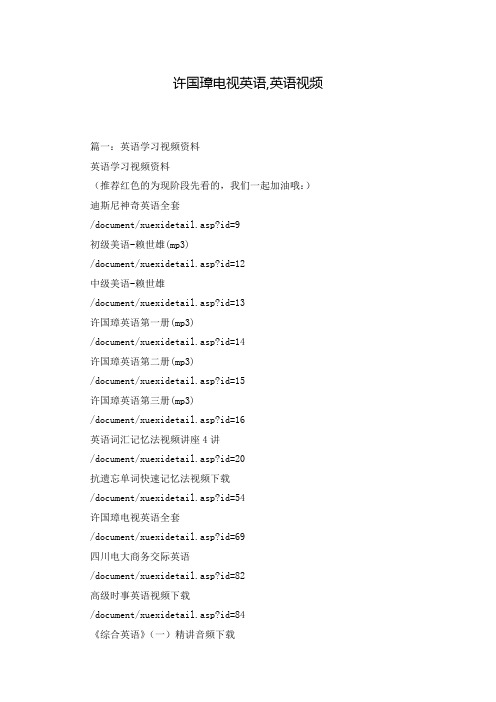
许国璋电视英语,英语视频篇一:英语学习视频资料英语学习视频资料(推荐红色的为现阶段先看的,我们一起加油哦:)迪斯尼神奇英语全套/document/xuexidetail.asp?id=9初级美语-赖世雄(mp3)/document/xuexidetail.asp?id=12中级美语-赖世雄/document/xuexidetail.asp?id=13许国璋英语第一册(mp3)/document/xuexidetail.asp?id=14许国璋英语第二册(mp3)/document/xuexidetail.asp?id=15许国璋英语第三册(mp3)/document/xuexidetail.asp?id=16英语词汇记忆法视频讲座4讲/document/xuexidetail.asp?id=20抗遗忘单词快速记忆法视频下载/document/xuexidetail.asp?id=54许国璋电视英语全套/document/xuexidetail.asp?id=69四川电大商务交际英语/document/xuexidetail.asp?id=82高级时事英语视频下载/document/xuexidetail.asp?id=84《综合英语》(一)精讲音频下载/document/xuexidetail.asp?id=106 李阳-疯狂英语口语和听力四本书mp3 /document/xuexidetail.asp?id=107 新概念英语第一册(MP3版)/document/xuexidetail.asp?id=299 新概念英语第二册(MP3版)/document/xuexidetail.asp?id=300 新概念英语第三册(MP3版)/document/xuexidetail.asp?id=301 新概念英语第四册MP3/document/xuexidetail.asp?id=302 英语学习翻译/document/xuexidetail.asp?id=332 完整版刘畅词汇flash下载/document/xuexidetail.asp?id=333 洋话连篇MP3/document/xuexidetail.asp?id=334 商务英语基础/document/xuexidetail.asp?id=3492005新东方阅读flash-周雷(全)/document/xuexidetail.asp?id=351 大学英语听力mp3/document/xuexidetail.asp?id=353 英语随口说[MP3] 练习口语好资料/document/xuexidetail.asp?id=488 新东方演讲-江博/document/xuexidetail.asp?id=646 新东方演讲-俞敏洪/document/xuexidetail.asp?id=647[西南师大][词汇学][14讲]/document/xuexidetail.asp?id=648 英语听力[音频]/document/xuexidetail.asp?id=649 英语专业翻译课程/document/xuexidetail.asp?id=650 交际英语(国家级)/document/xuexidetail.asp?id=651 新东方演讲-王强/document/xuexidetail.asp?id=652 英语3册(北京交通大学)/document/xuexidetail.asp?id=717 英语4册(北京交通大学)/document/xuexidetail.asp?id=718 高级时事英语(毛东辉)宁波电大/document/xuexidetail.asp?id=720 [上海外国语大学] 高级英语/document/xuexidetail.asp?id=893 综合英语视频教学资料/document/xuexidetail.asp?id=894 生活美语-语音下载/document/xuexidetail.asp?id=895 洋话连篇Ⅲ(视频RM)50集/document/xuexidetail.asp?id=896 李阳疯狂英语学习光盘/document/xuexidetail.asp?id=1137 疯狂英语900句2005精华版/document/xuexidetail.asp?id=1138 李阳疯狂英语/document/xuexidetail.asp?id=1166 高考英语语法/document/xuexidetail.asp?id=1198 高考英语听力/document/xuexidetail.asp?id=1199 高考英语阅读/document/xuexidetail.asp?id=1200 高考英语写作/document/xuexidetail.asp?id=1201 新东方《4+1口语语汇》/document/xuexidetail.asp?id=1214 新东方词汇112课FLASH讲解/document/xuexidetail.asp?id=1215 新概念英语全四册课本PDF版/document/xuexidetail.asp?id=1216 新概念英语视频第一册/document/xuexidetail.asp?id=1217 新概念英语视频第二册/document/xuexidetail.asp?id=1218 新概念英语视频第三册/document/xuexidetail.asp?id=1219 新概念英语视频第四册/document/xuexidetail.asp?id=1220 四川电大大学英语4(在线播放)/document/xuexidetail.asp?id=1228篇二:英语方面学习视频资料/subject/1932084//1310596/book.yoyobao/339320//bookstore/5441/book_17274844.html /isbn/978-7-5446-0471-0/ 资源名称---英语方面学习视频资料迪斯尼神奇英语全套/document/xuexidetail.asp?id=9初级美语-赖世雄(mp3)/document/xuexidetail.asp?id=12中级美语-赖世雄/document/xuexidetail.asp?id=13许国璋英语第一册(mp3)/document/xuexidetail.asp?id=14许国璋英语第二册(mp3)/document/xuexidetail.asp?id=15许国璋英语第三册(mp3)/document/xuexidetail.asp?id=16英语词汇记忆法视频讲座4讲/document/xuexidetail.asp?id=20抗遗忘单词快速记忆法视频下载/document/xuexidetail.asp?id=54从零开始学法语/document/xuexidetail.asp?id=55韩国语对话实习/document/xuexidetail.asp?id=68许国璋电视英语全套/document/xuexidetail.asp?id=69四川电大商务交际英语/document/xuexidetail.asp?id=82高级时事英语视频下载/document/xuexidetail.asp?id=84计算机专业英语在线教程/document/xuexidetail.asp?id=102 标准日语视频下载/document/xuexidetail.asp?id=105 《综合英语》(一)精讲音频下载/document/xuexidetail.asp?id=106 李阳-疯狂英语口语和听力四本书mp3 /document/xuexidetail.asp?id=107 《标准日语》初级视频下载/document/xuexidetail.asp?id=228 标准日本语中级视频/document/xuexidetail.asp?id=229 新概念英语第一册(MP3版)/document/xuexidetail.asp?id=299 新概念英语第二册(MP3版)/document/xuexidetail.asp?id=300 新概念英语第三册(MP3版)/document/xuexidetail.asp?id=301 新概念英语第四册MP3/document/xuexidetail.asp?id=302 英语学习翻译/document/xuexidetail.asp?id=332 完整版刘畅词汇flash下载/document/xuexidetail.asp?id=333 洋话连篇MP3/document/xuexidetail.asp?id=334 商务英语基础/document/xuexidetail.asp?id=349 2005新东方阅读flash-周雷(全)/document/xuexidetail.asp?id=351 大学英语听力mp3/document/xuexidetail.asp?id=353 youandme阶梯儿童英语字母学习/document/xuexidetail.asp?id=387 youandme阶梯儿童英语第一单元/document/xuexidetail.asp?id=388 /document/xuexidetail.asp?id=393 youandme阶梯儿童英语第三单元/document/xuexidetail.asp?id=394 youandme阶梯儿童英语第四单元/document/xuexidetail.asp?id=395 youandme阶梯儿童英语第五单元/document/xuexidetail.asp?id=396 开放英语/document/xuexidetail.asp?id=397 裕兴新概念英语FLASH全集/document/xuexidetail.asp?id=421 youandme阶梯儿童英语第六单元/document/xuexidetail.asp?id=479 youandme阶梯儿童英语第七单元/document/xuexidetail.asp?id=480 youandme阶梯儿童英语第八单元/document/xuexidetail.asp?id=481 youandme阶梯儿童英语第九单元/document/xuexidetail.asp?id=482 youandme阶梯儿童英语第十单元/document/xuexidetail.asp?id=483 /document/xuexidetail.asp?id=484youandme阶梯儿童英语第十二单元/document/xuexidetail.asp?id=485youandme阶梯儿童英语第十三单元/document/xuexidetail.asp?id=486youandme阶梯儿童英语第十四单元/document/xuexidetail.asp?id=487 英语随口说[MP3] 练习口语好资料/document/xuexidetail.asp?id=488 考研英语(2006)--阅读[FLASH]/document/xuexidetail.asp?id=645 新东方演讲-江博/document/xuexidetail.asp?id=646 新东方演讲-俞敏洪/document/xuexidetail.asp?id=647[西南师大][词汇学][14讲]/document/xuexidetail.asp?id=648 英语听力[音频]/document/xuexidetail.asp?id=649 英语专业翻译课程/document/xuexidetail.asp?id=650篇三:许国璋英语第一册课文、语法、对话文本许国璋英语第一册课文、语法、对话文本第二课a pen pensa map mapsa pet petsa spade spadesa letter letters一支钢笔钢笔(复数)一张地图地图(复数)一只宠物宠物(复数)一把锹锹(复数)一封信信(复数)第三课This is a pen.Is this a pen?That is a pencil.Is that a pencil?This is a desk.Is this a desk?That is a table.Is that a table?This is a disc.Is this a disc?That is a tape.Is that a tape?这是一支钢笔。
- 1、下载文档前请自行甄别文档内容的完整性,平台不提供额外的编辑、内容补充、找答案等附加服务。
- 2、"仅部分预览"的文档,不可在线预览部分如存在完整性等问题,可反馈申请退款(可完整预览的文档不适用该条件!)。
- 3、如文档侵犯您的权益,请联系客服反馈,我们会尽快为您处理(人工客服工作时间:9:00-18:30)。
1493年初,哥伦布回到了西班牙。全国一片欢腾,人们把他誉为做出了划时代发现的英雄,并成群结队地排在街道两旁向他欢呼致意。国王和王后把他请进皇宫。还从来没有一个普通人受过如此礼遇。
但是也有一些人嫉妒他的发现。他们问:“哥伦布是个什么人?他干了些什么?不就是个普普通通的意大利水手吗?像他那样横渡一下大西洋哪个不会?”
"Gentlemen," said he, "what could be easier than this? And yet you said it was impossible! It is the simplest thing in the world. Anybody can do it - after he has been shown how."
克利斯托弗·哥伦布
1492年10月12日,哥伦布发现了美洲大陆。为了这次横渡大西洋的惊人航行,他准备了18年。他同水手和学者们,同国王和王子们不知交谈和辩论了多少次。他总是说:“我敢肯定,往西航行跨过大洋,就能到达欧洲人从未到过的陆地。”可是人们都嘲笑他是个糊里糊涂的梦想家,几乎没人相信他的话。最后,还是西班牙国王和王后,因为想寻找一条通往印度的海路,才给了他船只和水手,使他得以实施他的计划。他横渡大西洋,发现了一块奇怪的陆地,那里居住着欧洲人不知道的一个民族,他以为这些地方是印度的一部分。
But there were people who were jealous of the discoverer. "Who is this Columbus?" they asked. "What has he done? Is he not an ordinary seaman from Italy? And could not any other person sail across the ocean as he has done?"
CHRISTOPHER COLUMBUS
Christopher Columbus discovered America on the 12th of October, 1492. He had spent eighteen years in planning for that wonderful voyage which he made across the Atlantic Ocean. He had talked and argued with sailors and scholars and princes and kings. "By sailing west across the great ocean," he would say, "I am sure I can reach lands that have never been visited by Europeans." But he had been laughed at as a foolish dreamer, and few people had any faith in him. Finally the Spanish king and queen, who were interested in finding a sea route to India, offered him ships and men so that he could carry out his plan. He crossed the ocean and discovered strange lands, inhabited by a people unknown to Europeans. He believed these lands to be part of India.
One guest after another tried the experiment. When the egg had gone the rounds and none had succeeded, all said that it could not be done.
Then Columbus took the egg and struck its small end gently upon the table so as to break the shell a little. After that there was no trouble in making it stand upright.
One day Columbus was at a dinner given in his honour. At the party were several of these conceited fellows, who very soon tried to make him uncomfortable.
Early in 1493 Columbus returned to Spain. There was great rejoicing in the country, and he was hailed as the hero who had made an epoch-making discovery. Crowds of people lined the streets to do him honour, and the king and queen welcomed him to their palace. Never had such great respect been shown to any common man.
Columbus made no answer; but after a while he took an egg from a dish and said to the guests, "Who among you, gentlemen, can make this egg stand on end?"
哥伦布没有答话。过了一会儿,他从盘子里拿出个鸡蛋对宾客们说:“诸位,你们谁能把这只鸡蛋竖起来?”
客人们一个接一个地尝试过了,鸡蛋在大家手里传了一圈也没有一个人能使它竖起来,都说这是不可能的。
于是哥伦布拿起那只蛋,把尖的一头轻轻往桌上一磕,敲碎一点蛋壳,这样就毫不费力地使鸡蛋笔直地立在桌上。
一天,哥伦布出席一个为他举行的晚宴。宴会上就有那么几个趾高气扬的人物,他们迫不及待地想使哥伦布难堪。
“你发现了大洋彼岸的新大陆,”他们开始进攻。“可是那算得了什么?我们可看不出那有什么值得大惊小怪的。谁都能横渡大西洋,谁都能沿着大洋彼岸的岛屿航行,就像你做的那样。这实在是世界上最简单这是不可能的!这实在是世界上最简单不过的事了。在别人已经示范过后----谁都会做。”
